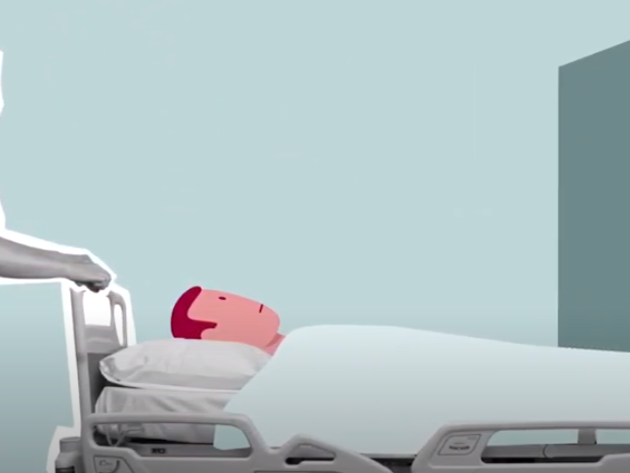Surgery for melanoma
Melanomas are surgically removed. This type of cancer rarely spreads through the body. If it does, the metastases usually occur in the lymph nodes, which will then have to be surgically removed as well.
If the cancer has spread to other parts of the body, we will have to determine whether surgery is still an option for you. Other treatment options, such as drugs, may be more beneficial for you.
More information
Surgery for melanomas – what to expect?
Melanomas are usually removed under local anesthesia. The surgery does not require hospital admission. Some people will need a skin transplant in order to cover up the wound. If your melanoma has spread to the lymph nodes and they have to be surgically removed, you will have to be admitted to the hospital. The removed tissue will be tested at the laboratory.
Effectiveness
Prospects for melanomas will depend on the development of the tumor. Chances of remission are 82%.
Preoperative screening
Before your surgery, you will be invited to meet with your anesthesiologist at the outpatient clinic for a consultation and a brief examination to assess your overall shape and any potential particularities we will need to keep in mind. The consultation assistant will measure your heart rate and blood pressure and will inquire about your height and weight. If needed, we can take those measurements during the appointment.
This preoperative screening will take approximately 20 minutes and will form the base of your anesthesia. Your anesthesiologist will listen to your lungs and heart and inspect your mouth and throat in preparation of the breathing tube that will be placed during surgery. Your anesthesiologist will also ask you:
Before your surgery, you will be invited to meet with your anesthesiologist at the outpatient clinic for a consultation and a brief examination to assess your overall shape and any potential particularities we will need to keep in mind. The consultation assistant will measure your heart rate and blood pressure and will inquire about your height and weight. If needed, we can take those measurements during the appointment.
This preoperative screening will take approximately 20 minutes and will form the base of your anesthesia. Your anesthesiologist will listen to your lungs and heart and inspect your mouth and throat in preparation of the breathing tube that will be placed during surgery. Your anesthesiologist will also ask you:
- whether you have been under anesthesia before
- whether you have any other conditions
- whether you have taken cancer medicine before
- whether you have had radiation treatment before
- whether you have any allergies
- whether you smoke
- whether you drink alcohol
- what kind of medication you take
Please inform your anesthesiologist of the type of medication and dose you take, and how often you take it. Your physician may want to run more tests before your surgery, such as: electrocardiogram (ECG), lung x-rays, a lung function test, or a blood test.
General or local anesthesia
Before your surgery you will be given general anesthesia, local anesthesia, or a combination of the two. General anesthesia means that you will be completely unconscious during surgery, whereas local anesthesia means that a part of your body will be numb and motionless.
General anesthesia
General anesthesia completely sedates your body. You will be given a cocktail of sleeping medicine, pain killers, and sometimes a muscle relaxant through IV. You will be unconscious within 30 seconds. You will be ventilated during the entire process.
If you are having major surgery, we will place a respiration tube in your throat. For smaller surgeries, a small cap in the back of the throat will suffice. We will closely monitor your heart rate, blood pressure, breathing, and temperature through our monitoring devices.
Local anesthesia
If you are given local anesthesia, you will be conscious during your surgery. Local anesthetics are usually administered through an epidural in the spine, and will temporarily numb all body parts underneath. We may place a tube to give you IV pain medication during and after surgery.
Your anesthesiologist will keep a close eye on your blood pressure, heart rate, breathing, and temperature in order to adapt the anesthesia if needed.
Most people undergoing major surgery will be given a mixture of general and local anesthetics.
Side-effects
Melanoma surgery rarely causes complications. You may experience bleeding, or your wound may open up,or get infected. These complications are easy to treat.
In case your tumor has spread through the body, your surgery will be more invasive, which increases the risk of complications. The nature and severity of these complications varies.
After your treatment
Melanoma surgery does not require hospital admission. However, if your cancer has spread, requiring the removal of your lymph nodes, you will be admitted for one or more days.
Before you leave, we will give you further wound care instructions and advice. We will also plan regular screenings. During your first screening consultation, you will receive the results of the tissue analysis. Screenings will occur once every 3 months and will decrease in frequency over the next 5 to 10 years.
The illness may return, usually on or under the skin. We will see and feel whether this is the case for you during your screening appointments. You can help us detect cancer recurrence early. We will give you further instructions on how to do this. Treatment is possible as long as the disease is detected in a timely manner.
 nl
nl
